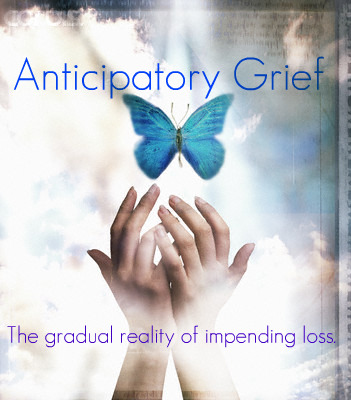In Elizabeth Kubler-Ross' book "Death and Dying", the term "preparatory grief" is used to describe how the terminally ill patient prepares himself for his/her departure from the living world. Today, the term "anticipatory grief" is used to describe the mourning that occurs before the actual death or in anticipation of an impending death.
Whereas, preparatory grief involves the patient themselves, anticipatory grief involves both the dying and those close to them. Anticipatory grief is percieved of those things lost by death, namely, the loss of the loved one and that of life itself. Anticipatory grief involves life from the past, present and that of the future for both the patient and their loved ones.
In anticipatory grief the life of the patient and their family is re-examined; the closeness of relationships, life accomplishments and the anticipation of missed family events. It is preparing for a life-changing event that affects every aspect of one's life.
Anticipatory grief is a multitude of emotions that can swing back and forth, in different directions or come at you all at once. It is emotions that can vary from intense and conflicting to guilt and shame. It is the feeling of helplessness to change the inevitable for those grieving the impending loss. For the loved one, it can be surreal, the feeling of not being ready to let go of their life.
Anticipatory grief can strengthen the bond between the patient and loved ones, particularly in siblings. The impending loss frequently intensifies the attachment to the dying person, causing an increase in concern for what they should or shouldn't do to comfort them. In contrast, anticipatory grief is a time for the gradual release of the dying person; saying "good-bye", "I love you", or "I forgive you".
This period of grief before death is beneficial in preparing one emotionally and is a time to resolve old issues. The one concern is that the dying person may experience too much grief, causing social withdrawal and detachment. They may have thoughts about life after death. They may even imagine what their loved ones life is going to be like without them after they are gone. Anticipatory grief is hard work and unpredictable.
The Phases of Anticipatory Grief
Phase I
The individual realizes that death is inevitable. There is no expectation for a cure. Sadness and depression is often associated with this first stage of grief. Loved ones and the person dying may demonstrate signs of denial, anger, or calmness and acceptance.
Phase II
During this phase there is concern for the dying person. Loved ones may feel the need to reconcile differences or past arguments. Family members may be concerned for the dying persons fear of death. The dying person may become withdrawn, preferring to keep thoughts to themselves. Being close to the person dying is important and provides great comfort and support.
Phase III
In this phase the actual death is "rehearsed". They dying person may request their wants and preferences for funeral plans. Loved ones may feel the need to say good-bye or to be close to the dying person as part of anticipatory grief.
Phase IV
This last phase family members and loved ones may start to imagine what their lives will be like without the person that is dying. Siblings may begin wondering what it's like to lose a brother or sister. Loved ones may begin thinking about family events such holidays, birthdays, weddings, and births of babies without the presence of the dying person.
The individual realizes that death is inevitable. There is no expectation for a cure. Sadness and depression is often associated with this first stage of grief. Loved ones and the person dying may demonstrate signs of denial, anger, or calmness and acceptance.
Phase II
During this phase there is concern for the dying person. Loved ones may feel the need to reconcile differences or past arguments. Family members may be concerned for the dying persons fear of death. The dying person may become withdrawn, preferring to keep thoughts to themselves. Being close to the person dying is important and provides great comfort and support.
Phase III
In this phase the actual death is "rehearsed". They dying person may request their wants and preferences for funeral plans. Loved ones may feel the need to say good-bye or to be close to the dying person as part of anticipatory grief.
Phase IV
This last phase family members and loved ones may start to imagine what their lives will be like without the person that is dying. Siblings may begin wondering what it's like to lose a brother or sister. Loved ones may begin thinking about family events such holidays, birthdays, weddings, and births of babies without the presence of the dying person.
Subscribe to:
Comments (Atom)
